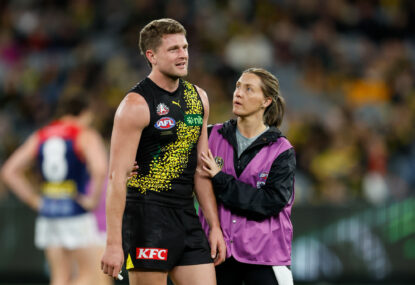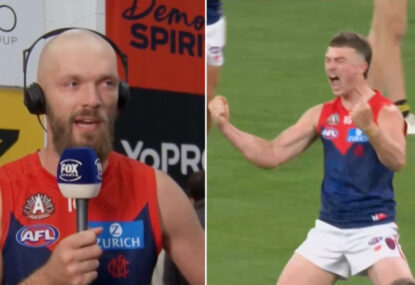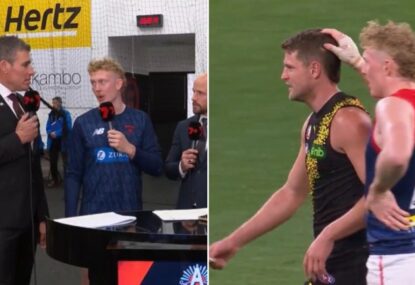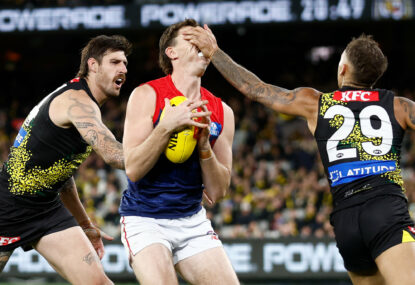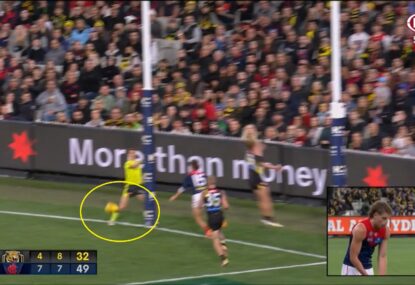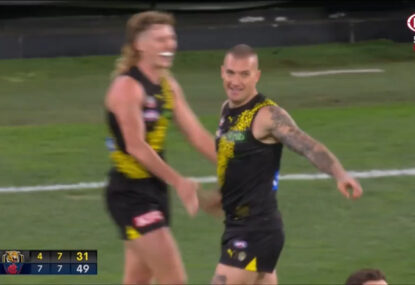
Melbourne Coach Dean Bailey looks on during the AFL Round 19 match between the Geelong Cats and the Melbourne Demons at Skilled Stadium, Geelong. Slattery Images
“You mightn’t select a senior guy who you know is not going to be with you next year for the sake of having a look at a younger bloke … In some people’s eyes, that’s wrong,” AFL Football Operations manager Adrian Anderson said on Tuesday on the topic of tanking.
It’s funny when it’s spelt out like that: ‘tanking’ doesn’t seem so bad. In fact, it starts to make a lot of sense.
But then again, is that necessarily tanking?
Indeed, there’s been a lot of discussion and debate about the topic of tanking this week following comments made by sacked Melbourne coach Dean Bailey. And essentially what all the discussion has shown is there are different degrees of tanking.
One thing is for sure, AFL footballers are a competitive lot and always go out there to try and win. That’s surely not up for debate.
However, coaches and management giving their side the best opportunity to do just that is what’s up for debate.
Sometimes they may not deem winning in their best interests, given the current draft and priority pick system whereby the benefits of a loss can outweigh the benefits of a victory.
Bailey got every AFL journo in the country excited when he said on Monday: “I had no hesitation at all in the first two years in ensuring the club was well placed for draft picks.”
He added: “I was asked to do the best thing by the Melbourne Football Club and I did it. I put players in different positions.”
However, he later moved to clarify that comment when he said: “I experimented to a level that meant that we got players into certain positions and we developed them in those positions.”
Whatever the clarification, people will recall the Round 22 game in 2009, when Bailey played several players out of position in a 47-point loss to St Kilda.
It shouldn’t be forgotten that the Demons were only 16 points down at three-quarter time, in the send-off game for long-serving trio Russell Robertson, Matthew Whelan and Paul Wheatley. Then after a series of player positional changes – such as taking James Frawley off Nick Riewoldt – the Saints got on a roll and kicked away.
This kind of tanking, which involves experimentation and moving players out of position, certainly has a bad smell about it.
Another club to come into question for tanking this week has been West Coast after they claimed the wooden spoon and a priority pick (used to secure star rookie Jack Darling) last year.
The Eagles had a shocking season in 2010 yet have become top four contenders in 2011. That incredible improvement has aroused some suspicion.
The point of contention was the decisions by the Eagles to have key trio Darren Glass, Andrew Embley and Dean Cox end their respective seasons early for surgery to troublesome injuries with a view to 2011.
Some call that tanking, others would call that smart. The reality is the Eagles had won four games to that point and had little to gain by continuing to play those players.
Of course, that helped earned them a priority pick by only winning four games at season’s end but getting the operations done on those players and giving them the best chance to recover in time for pre-season had a long-term view about it.
As these two examples show, there’s two distinct differing degrees of tanking here and that’s an important point following talk from the AFL’s Adrian Anderson that they may act on the issue.
Possible action could be to change the way the draft system works in the AFL whereby the wooden spooner doesn’t automatically get pick one. Instead, perhaps an NBA-style system could be introduced with the bottom four clubs going into a lucky dip to see who’ll win the number one pick (with the odds stacked in the favour of the wooden spooner, but not guaranteed).
Another change could be whereby priority picks aren’t designated on the basis of wins-losses, but rather after the judgement of an independent body who can analyse a team’s performances over two seasons taking into account player injuries.
However, would such changes have an effect considering the differing degrees of tanking?
Perhaps Melbourne would think twice about shuffling the deck midmatch, but would West Coast have done any different?
In a competition like the AFL where there’s little incentive to avoid the wooden spoon (besides for pride), there’s always going to be this danger of clubs taking it easy towards the end of the season, whereas in, for example, the English Premier League where relegation exists, clubs will always fight to the death to win games.
Indeed, this is the point of contention and something which will be impossible for the AFL to change unless they make a radical new policy.
It’s a topic which hits hard at the integrity of the competition, particularly when one side isn’t putting all their resources into an AFL match.
However, it’s not one easily policed, nor fixed.






























































































